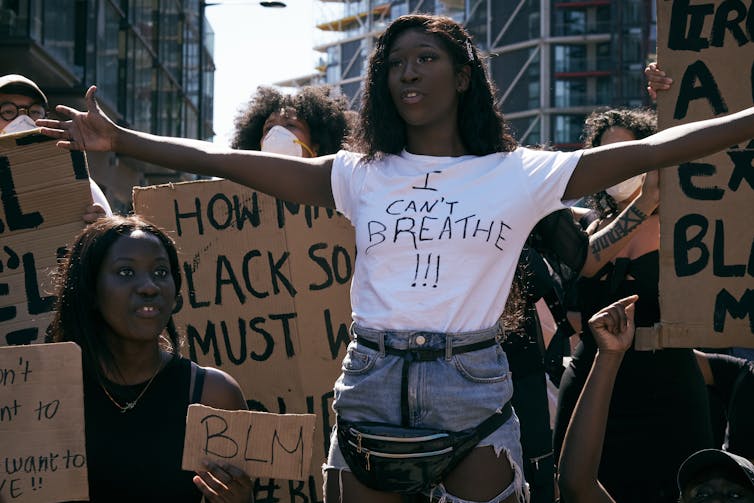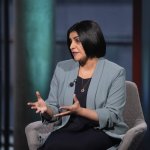arindambanerjee/Shutterstock
Since the killing of George Floyd, an African American man, during an arrest in May, 69% of people in the US report having discussed racial issues with others. Meanwhile, as the Pew research suggests, 82% say they will work with black people in their communities to resolve issues and 67% say they are supportive of the Black Lives Matter movement.
This is to be welcomed, because people’s inability to discuss race issues in a civil manner has further contributed to minority inequality and conflict. Indeed, this failure to have forthright discussions about race has led to people of different ethnic groups living parallel lives in the same cities.
This, along with the decreased life chances for non-white people in many western countries, is what the Black Lives Matter movement aims to eradicate. But it’s also important to recognise that one of the reasons Black Lives Matter came about in the first place is because the concept of multiculturalism has failed black people.
What is multiculturalism?
In essence, multiculturalism is the practice of giving importance to all cultures in a society. It rejects the idea that culture should be a “melting pot” and rather supports the notion of what sociologists refer to as the “salad bowl”, where different cultures coexist without domination; and where there is an integration and representation of cultures in various institutions, which can help to foster tolerance, cohesion and understanding.
The multiculturalism movement has gone through many different stages, influenced by historic events. But multiculturalism as many people think of it today came about as a result of the post-civil rights era. This was when multiculturalism moved away from its original focus of ethnic minority rights and became integrated with various human rights campaigns. Disadvantaged groups – such as women, people with disabilities, people of different religions, languages and social class – joined this struggle for equality against oppression.
As race issues became less important in the multicultural movement, equality for everyone became a more prominent theme. And this focus on equality and human rights for all, meant that multiculturalism failed to achieve transformation for black people in particular.
Racial inequality
Many sociological theorists have argued that multiculturalism has made little difference to black people’s lives because the majority of white people benefit from an oppressive system, so do not see a problem with the status quo. And multiculturalism, it seems, has been unable to fully challenge this oppressive system.
Historically, black people have found themselves at the bottom of the pile. This is not to say that racism directed at other groups is not significant, but racism harms black people the most.
Take, for example, the fact that schools in minority communities tend to be not as well equipped and the fact that black children in both the UK and the US are disproportionately more likely to fail in school than other ethnic groups. Research from the UK has also found that black people are more likely to be discriminated against when applying for a mortgage or when wanting to rent a house.
Studies from the US and the UK have also shown that black people are more likely to have access to poor social amenities, are more likely to be discriminated against in the job market and are paid less for the same job.
Add to this the fact that black people in the US are more likely to be killed by the police, have high rates of teenage pregnancy, but are also much more likely to lose a child in childbirth – this is also the case in the UK. As if this wasn’t enough, black people are also more likely to go to jail and have higher chances of having a chronic disease or a mental health issue.
So while black children may start off with the same dreams as children from other ethnic backgrounds, as they move through life the options open to them narrow – dreams are abandoned and hope is lost.
Systemic failures?
It’s crucial to appreciate that racism is so systemic that without people drawing attention to the deep-rooted and often invisible nature of the issue, it would be easy for many people to ignore.
This is why the Black Lives Matter movement wants to confront and shake up the system and bring the plight of black people to the global consciousness.

Matteo Roma/Shutterstock
In her book White Fragility, author Robin DiAngelo explains that black people are the “ultimate racial other”. And that white people routinely become defensive and disbelieving when their ideas about race and racism are challenged. It’s maybe not surprising then that just as Black Lives Matter went global, so too did the backlash.
Research has found that those most likely to be prejudiced against Black Lives Matter are white people with conservative views. This is maybe not totally surprising but for there to be real change for black people it is vital that everyone is able to recognise the benefits of a more integrated society.
This is where teaching children a broader curriculum that includes black history would help. As would a focus on past and present campaigns for racial and social justice. Indeed, this would help students to appreciate links between global histories and those of their own communities. Because without Black Lives Matter the promise of true multiculturalism will continue to remain something of a pipe-dream.
![]()
Colins Imoh is affiliated with the following organisations:
• Editorial Board Member – In Factis Pax Journal
• International Institute for Peace Education – Advisory Board Member
• International Steering Committee – Africa Peace Fellows –California State University, Sacramento











